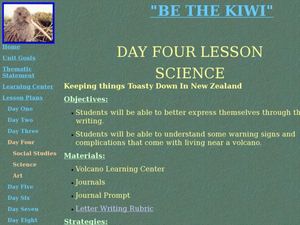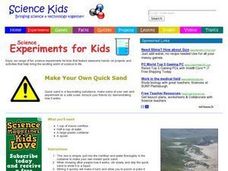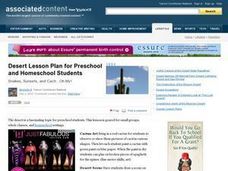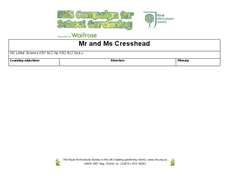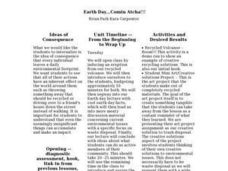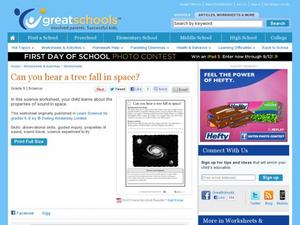Curated OER
Keeping Things Toasty in New Zealand
Students identify the signs of a volcanic eruption. In this earth science instructional activity, students compose a letter to their neighbor convincing them of an impending eruption. They recognize the danger in living near a volcano.
Curated OER
Make Your Own Quick Sand
Students create a quick sand model using cornflour and water. In this earth science lesson plan, students explain why stirring the mixture quickly makes it thick but the opposite happens when you stir it slowly.
Curated OER
In the Desert
Students explore earth science by completing several environment activities. In this desert lesson plan, students identify where the U.S. deserts are and what types of wild life inhabit them. Students utilize arts and crafts to create a...
Curated OER
Mr. and Mrs. Cress Head
Students explore Earth science by completing a plant art project. In this botany instructional activity, students utilize tights and soil to create a furry, grassy puppet style animal from cress seeds. Students cut off the excess cress...
Curated OER
How Does Flowing Water Shape a Planet's Surface?
Students investigate how flowing water influence landforms. For this earth science lesson, students observe water behavior as it flows from the stream table at various inclinations. They discuss whether water shaped Mars landforms or not.
Curated OER
8th Grade Earth Science: Density
Students draw upon their prior knowledge of the density of water and practice writing a hypothesis, making an observation, and analyzing data while watching a density demonstration.
Curated OER
What is evolution and how does it work?
Students discuss the theory of evolution. In this evolution lesson, students discover Charles Darwin and his ideas of heredity, variation, and selection. This lesson gives information for the students to read.
Curated OER
What Is That Bubblin¿¿¿ In My Back Yard?
Young scholars create a map plotting local sites the Environmental Protection Agency has on its EPA Regulated Sites list. They discuss the need for citizens to, at a minimum, be aware of potential pollution hazards in their community.
Curated OER
Ozone: The Earth's Security Blanket
Students work in groups to define and research the terms: ozone, troposphere and stratosphere. Students watch videos, conduct Internet research, participate in discussion groups and complete worksheets.
Carnegie Mellon University
Bathtub Model
Using a colorful infographic handout and a guide sheet, hold a class discussion about how a bathtub can serve as a model for the greenhouse effect created by Earth's atmosphere. Participants will understand that as energy or matter is...
Curated OER
Earth Day...Comin Atcha!!!
Students explore the idea of consequence that every individual leaves a daily environmental footprint. They read articles about creative solutions to solid waste issues and then create an artwork from household trash.
San Francisco Public Utilities Commission
Recycled Water: A Smart Way to Reuse Water
Learn about wastewater and recycled water with a science reading activity. After learners finish a two-page passage about conserving the water supply, they answer six comprehension questions about what they have read.
Curated OER
Lotto or Life: What Are the Chances?
Though the website does not seem to have the mentioned video, a reding and lottery style games simulate the chances of finding intelligent life somewhere other than Earth. Without the video, this lesson is short, but it can be a useful...
Curated OER
May Earth be Revolving around the Sun?
Ninth graders explore how Aristarchus used the position of the half-full Moon to estimate the distance to the Sun, and how he made a great error, but still figured out that the Sun is much larger than Earth.
Curated OER
Unit VIII: Worksheet 3 - Central Force
Beginning physicists imagine being aerospace engineers by solving seven centripetal force problems. They calculate the work, speed, time, and acceleration of objects in orbit: a satellite around Earth, and Earth around the sun. This is a...
California Academy of Science
Carbon Cycle Role Play
Anytime you make concepts clear with role playing or hands-on experience, it's a win for the whole class. Ping-Pong balls are used to represent carbon in a carbon cycle role-play activity. In small groups, children first discuss what...
Curated OER
Unit VIII Worksheet 5: Circular Motion
Seven problems send physics stars out of this world! Challenge learners to calculate centripetal force, time to complete revolutions, circular speed, and acceleration. They also are asked to explain scenarios and draw a force diagram for...
Lewiston High School
Weight and Mass & Forces in Equilibrium
I would weigh less on the moon? Send me there, then! On the top of the first page, a cartoon image demonstrates the difference between Earth and the moon. It then goes on to describe weight and mass and provides five practice problems...
Curated OER
Exploring the Water Cycle
The water cycle is one of earth's most easily observable processes, but demonstrating each step within classroom walls can be a challenge. Through a series of videos and quick demonstrations, cover each aspect of the hydrologic cycle in...
Curated OER
Can You Hear a Tree Fall in Space?
How does sound travel in space? Fifth graders investigate this question with a science activity, in which they research the properties of sound. Schedule a lab visit for individual Internet research, or include the activity after you...
Chicago Botanic Garden
Calculating Your Ecological Footprint
You can lower your ecological footprint by recycling! Lesson four in this series of five has individuals, through the use of a computer, calculate their ecological footprints. Through discussions and analysis they determine how many...
Purdue University
Design of an Earthen Dam for a Lafayette Neighborhood
How do dams support bodies of water? Scholars engage in a hands-on STEM activity where they design, build, and test dams to learn about bodies of water and how humans use natural resources. They learn how criteria and constraints affect...
Journey Through the Universe
Going through a Phase
Ignore the full moon, it's just a phase. Young scholars observe and record the moon during a full cycle before learning to predict future phases. Then the instructor leads a discussion on the other solar system objects that...
California Academy of Science
Natural Resources Bingo
Bingo isn't just a silly game, it's a great way to practice all types of skills. After reviewing that the earth is composed of natural resources, what those natural resources are, and sustainability, the class plays a game of bingo. The...
